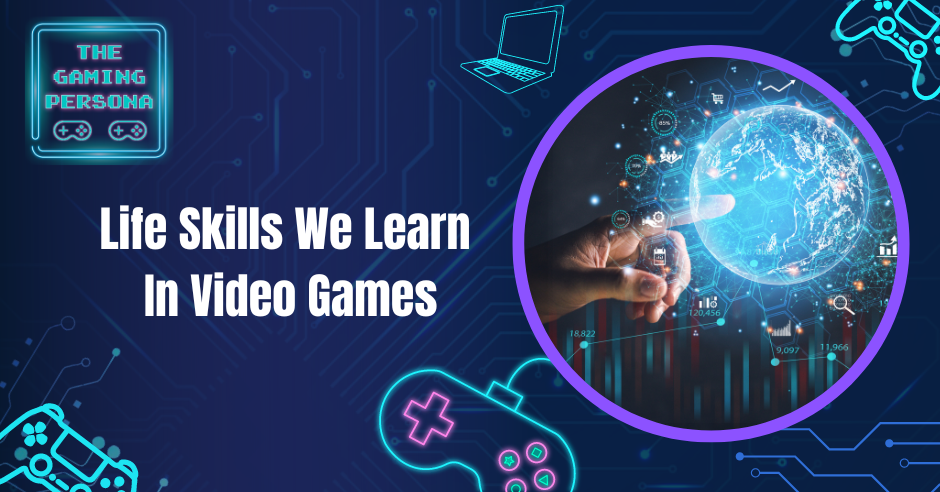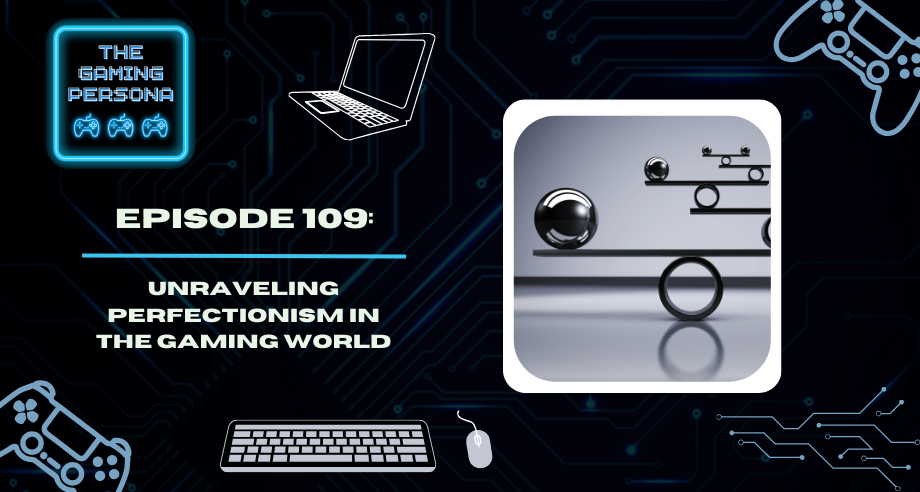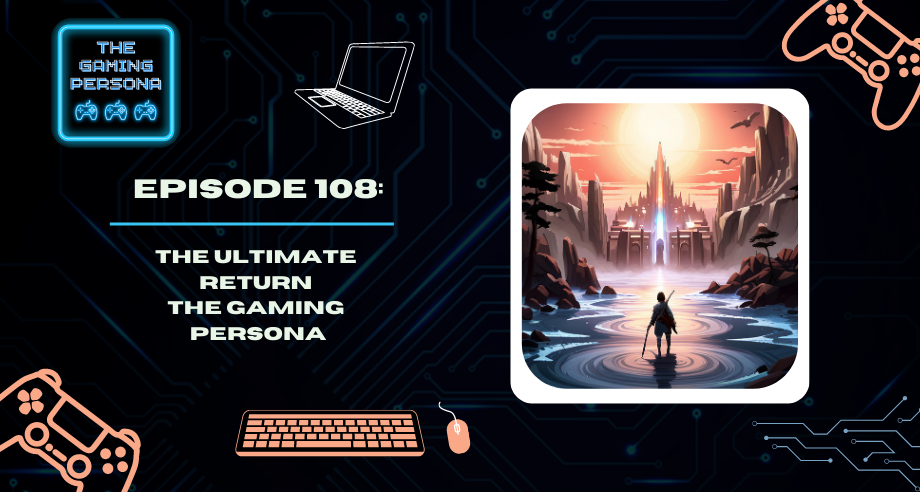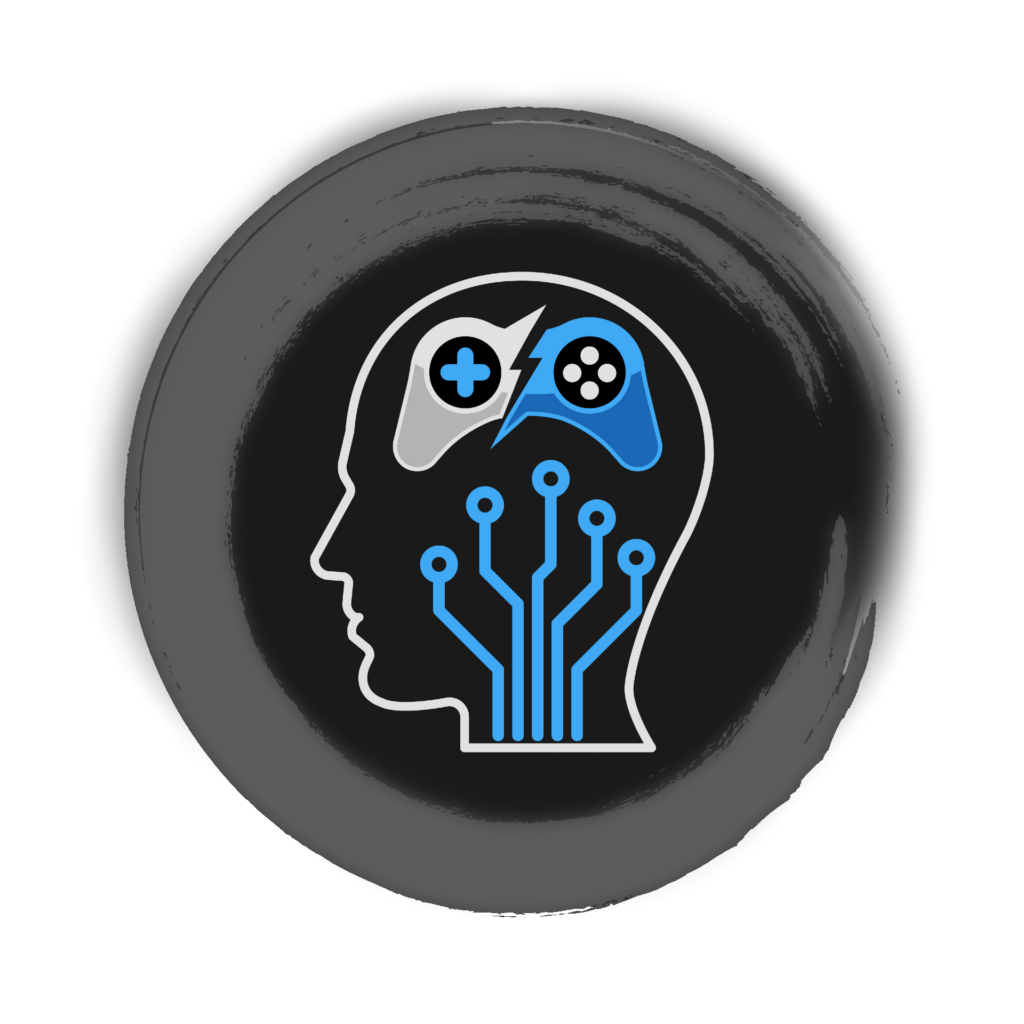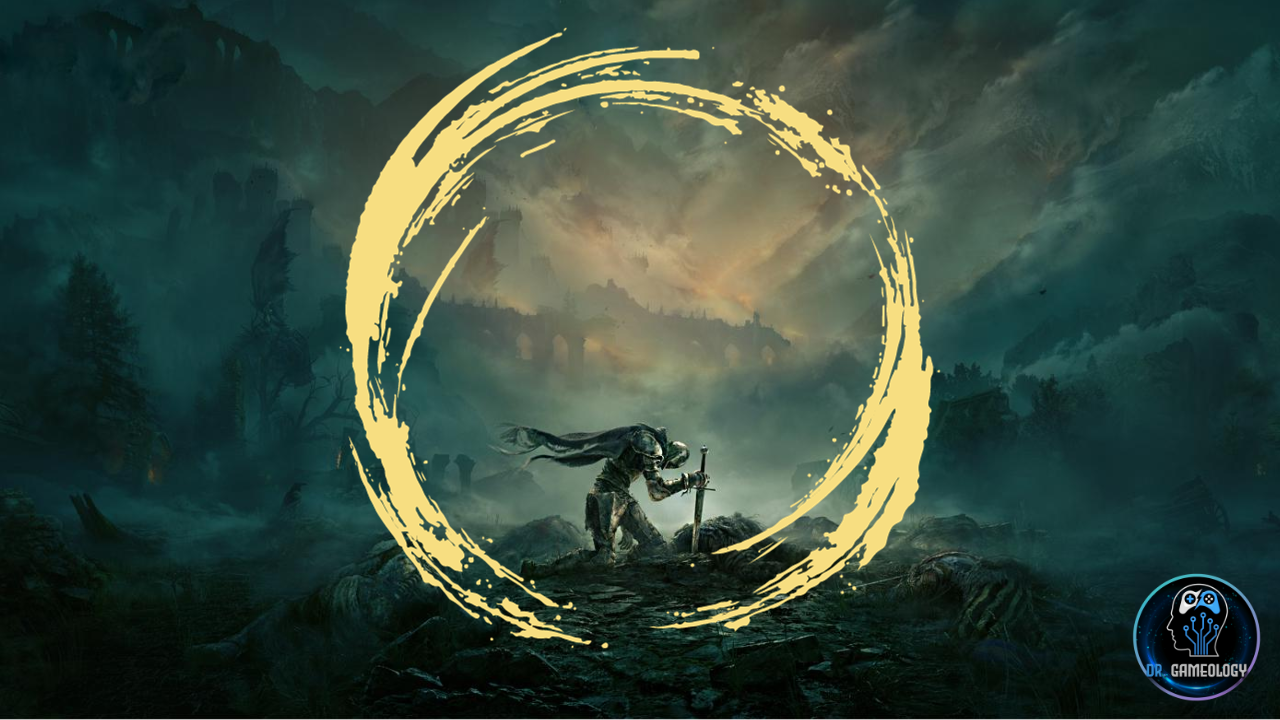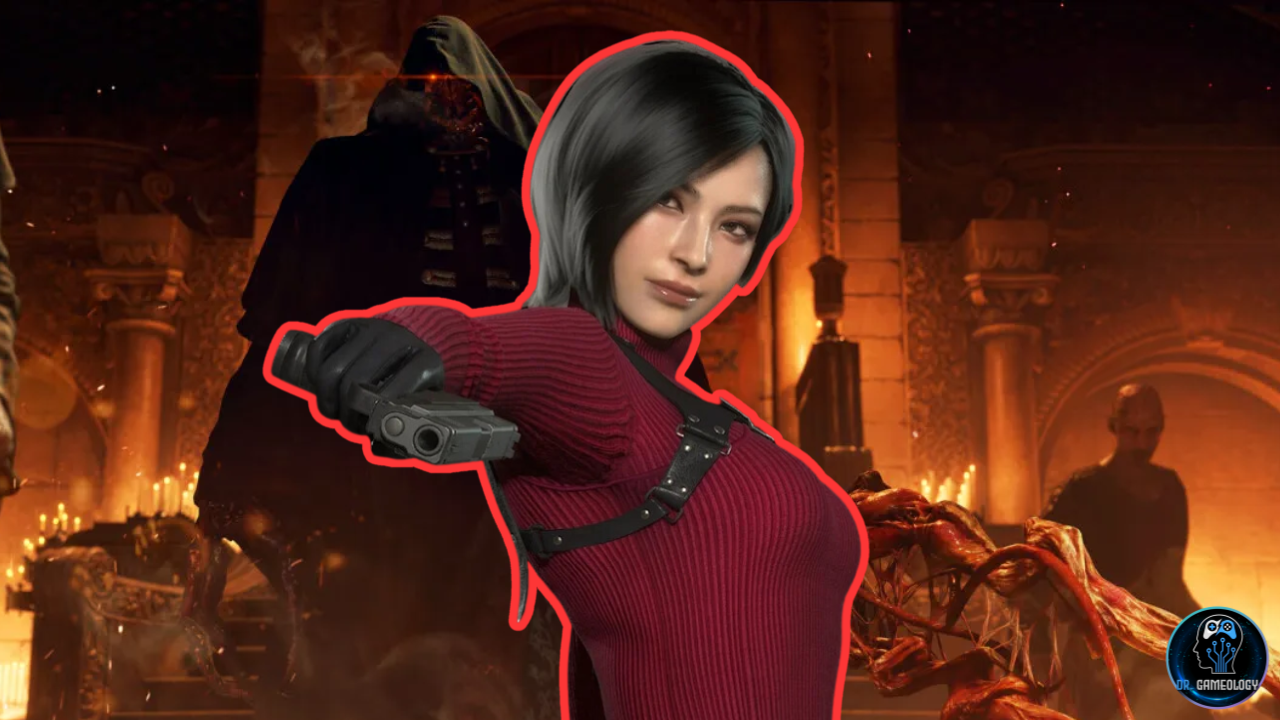Your video game habits can transfer into your real life as life skills. If you’re an achievement hunter and will not rest until you collect everything in the game, then maybe you can set up a to-do list for your work. That list can emulate that achievement collecting experience so that you will be motivated to finish your work.
We use so many life skills to conquer the many problems we face each day. Some of these skills are taught to us by video games. Each time we practice a new skill, we potentially level up our abilities to handle new situations more effectively. In this episode, The Gaming Persona welcomes a new cohost to join the weekly discussion – Gene Wong! Now, as a three-person panel, the TGP hosts seek to expand the catalog of games and bring in new motivation perspectives to the ever-expanding discussion of who we become when we play games.
—
Listen to the podcast here
Life Skills We Learn In Video Games
I’m DrGameology on Twitch and other social apps. You can find all of my gaming ideas as they come out at DrGameology.com. The Gaming Persona can be found everywhere. You already know that because you’re reading, which is something I talk about every episode. Jenny, what are we talking about from the world of video games?
We are going to be talking about life skills that come from video games.
Can I tell both of you a secret after hearing what we’re going to be talking about? There is no way that I would be done talking about that topic in under an hour. This is the 73rd installment of that topic. You read it here, everyone. We didn’t know what topics we have. We’re like, “What are all the episodes about? Let’s do that.” Let’s start with The Ordinary World where we share everyday life through our games. For The Ordinary World, I want to hear from both of you. I’ve been looking forward to this. How is your week in the world of gaming?
My wife and I have been co-piloting The Great Ace Attorney Chronicles. If you’re not familiar with that, The Ace Attorney Series is a visual novel-style game where you play a defense lawyer, defending people from homicide charges. The thing about this series is that the court has minimal rules and everything is over the top.
Think of a courtroom that was run WWE style. People were barging into their courtroom with steel chairs beating up witnesses. There are ghosts somehow. Someone ghost for testimony. It is a visual novel. It is mostly dialogue choices. There are scenes where you investigate the crime scene to find evidence to present but it is over top and animated. Don’t think it’s a boring-style game where you argue back and forth in court. It’s a lot of drama.
Everyone has their own makeup of gaming motivations. Click To TweetGene, I’m playing through Danganronpa, which also is not a boring reiteration of courtroom processes.
It is somewhat similar. With Danganronpa, you get to wander around the school. It’s a slightly different experience. It’s more you driven.
Jenny, have you heard of Danganronpa before?
I have not. Honestly, when you said that word, it made me think of the office, Dwight, when he’s talking about their Christmas traditions. I don’t know why.
The game I’m playing is about a little more than a dozen teenagers who have been taken from their wives and locked permanently into a high school environment. The only way to get out is to kill another one of the high schoolers and get away with it, not being caught in their trial system. There are all kinds of rules that govern what kinds of murders are allowed and how you do them. If you break the rules, there are Gatling guns all over the school mounted in the corners of the rooms and they will take you out.
The host of this experiment of death is a bear that has a white side and an evil black side. He’s deranged. I don’t know all the secrets about this game. It’s not a new game but the court battles are pretty difficult because you have to think exactly the game once you think and if you vote for the wrong person, they vote for the wrong person. If that happens, the killer gets away with it and everyone else dies. You have to try the trial again. These are long experiences.
These both sound like games I would have never even thought to pick up but they do some fun.
There will be a future scenario where I have to stream Danganropna because if you put me with the psych squad and everyone else who shows up, that would be a lot of fun to experience all the randomly dead teenagers. Even if I knew the story, it would be fun.
At first thought, I didn’t play because I hadn’t been on in a couple of weeks but I did play. I played Final Fantasy and did the second near raid, which is Puppets’ Bunker, which was not as hard as I thought it would be. It was grosser than I thought it would be.
Have you experienced the actual MMO games?
No. I don’t know anything about it and I also am not a story person. I fast forward through all the cutscenes. I don’t know what’s happening but it was gross.
If you watch them, you wouldn’t know what’s happening.
I did the raid with our guild and also a couple of friends. We were talking about how long it was going to take to set up for the next raid, which is the tower raid. Jess, our friend who has also been on the show, was saying that it was a 2 to 3-hour process. I was like, “Does that include watching all the cutscenes?” She was like, “Yes.” I was like, “I’m not doing that. It’s not going to take me that long.” Someone else that was on our discord was like, “Why would you play Final Fantasy if you don’t care about the story?” I was like, “I am motivated by the social aspect of this game.” I didn’t go into it. I thought it was funny.
I did all of the lead-up stuff for the tower raid. I will say I don’t ever want to see Konogg again. He made me go everywhere and I didn’t understand why he didn’t stay in one place. If I read the story, I probably would understand. I did all of that stuff and never got to play tower. I’m looking forward to a day that I can.
That whole thing about the confusion about why you would skip the story, Final Fantasy XIV happens to have a fan base where the majority of people accept and expect that the story is one of the best video game stories ever told. I even believe that. The problem is when I sit down to play an MMO, I don’t want that much story. I want to study that story at a time when I’m not in, “Let’s play a game,” mode. One of the things that do factor into our show is the idea that everyone has the makeup of their gaming motivations.

I’ve been on a few dungeon runs where the duty is a four-person thing. I’ll be playing a class that I don’t know and I’m not comfortable at. Sometimes people are helpful and they’re like, “You have this move. It does this.” That’s helpful but other people will give me the entire rotation and make my head spin because I don’t know the names of my moves yet because this might be the 3rd or 4th time only that I’ve ever played the class.
Sometimes, I’ll push back and say, “You’re giving me way too much information. I don’t think I can handle that during this run. I will look the information up afterwards.” They’ll get puzzled by what I said there. Sometimes they’ll keep pushing and I’ll have to tell them, “You’re making this dungeon harder for me to play because I’m worried about playing poorly, instead of you letting me do what I know will work.”
It’s that idea of why would you play a class if you can’t optimize the amount of damage output because I’m smart enough to tell you how to do it. That’s a different motivation. It’s not a story, which is an immersion motivation. That one is more of an achievement but it’s still the same parallel interaction with our communication skills. The way that I prefer to play is the way most people play. The answer is not at all.
I didn’t take any offense. I thought it was funny and something that I needed to bring up on the show because I was like, “Many people don’t think about that.” I love the outfits, glamours and doing things with my friends. That’s all I want to do.
We have enough information from the games that we’ve played to get into the heart of our conversation. Let’s begin our Call to Adventure. This is where we get into the topic for this episode. Right out of the gate, I found an article about video game achievements. It seems to be a book chapter or a portion of a book. Everything you can think of to talk about related to video game achievements is in this publication. I wanted to open it up to all of us about what kinds of achievements we can think about from video games that have taught us something about ourselves. Does anyone have any ideas for that? I have millions but I don’t want to go first on this one for curiosity reasons.
Achieving is one of my main motivators when I play video games. It’s my second highest percentage-wise. When a game has achievements in-game like things that you can collect or do in-game a certain number of times, that is something that I’m drawn to. A specific example is Sea of Thieves. They have plenty of different achievements that you could do.
One that I wanted and it’s the only one I ever worked hard to complete was the party boat achievement. It’s a fun aesthetic thing that you have to go after. In the game, one of the utilities is a lantern. The lantern, by default, glows yellowy, glowy color. If you die by certain things in the game, for instance, if a shark bites you and you die, you can change the color of your lantern to blue when you’re in the ghost ship waiting to materialize again. That might not make sense to people but there are certain things that you can do to get different color lights on your lantern. I thought it was fun and a cool little aspect of the game. There were pink, purple, red, white and all those things.
There’s a specific achievement. If you light all the lanterns on your ship in different colors, every single pillar, you get a certain achievement. I went and did all this stuff to be able to do that. It was fun. There was one day that my friend and I did each and every achievement leading up with fun. It was a fun way to spend my playtime that day. The way that translates for me in games is in real life, I’m also an achiever. It’s a thing that has been ingrained in me since I was a child. If I make my “To-do lists,” it’s something that drives me and motivates me to get things that I need to get done.
I am a photographer. I have a long editing queue. The way that I do my achievement list or editing is I create a spreadsheet. I have a spreadsheet that has every single session that I’ve shot in the dates that they were shot, the dates that they’re due and the dates that I’m going to work on each one. Once I’m done with a particular session, I’m allowed to type in done on that column and move on to the next. It’s a way that I’ve used to structure my life. It would be fun if I could create something a little more eye-catching than an Excel spreadsheet but I work with what I have.
Your spreadsheet sounds like it’s your quest log.
Once it’s done, I will have a platinum trophy in my editing queue.
You’re going to play the sequel.
This is true, such as in life.
The difference between your spreadsheet and an actual video game platinum trophy is that it’s permanent and you’re done. If you play this game beyond that, it’s because you love the game and it was never about trophies.
It is true about my photography career.
The best achievements are those that, by their very existence, create a mystery to solve. Click To TweetIt’s funny that we’re talking about this because I platinum trophied Elden Ring. It should have been part of my Ordinary World. I streamed it for the first time since I got stuck on my first playthrough. I cleared to the Lake of Liurnia and only died once. It wasn’t even an interesting boss death. A bird caught me four times. I ran through the mob again. I claimed my ruins. The ruins didn’t fade into existence but I was able to beat Morgott. The first one, is that Margit?
Morgott is the true one.
I beat the two of them in one shot. This is my fifth playthrough of the game but I have never beaten both of them in one shot. It blew my mind. I want to call our attention to the idea that there are different kinds of achievements in-game. I’ve beaten them before. That trophy has popped and it’s on my player profile.
At least any weapon they drop or any ghost that you inherit from them are game-defined achievements but the player-defined achievement for me is can I play Elden Ring well with a leveled-up character on stream with people watching? I platinum trophied the game by myself alone in my room. That’s great but I want to see if I can enjoy the inevitable failure with an audience. There’s a platform to find achievements, which are the trophies.
A lot of times, the game-defined achievement is the gear item, the mount, the additional feature for your character or the reward for doing something in the game but the platform itself has the achievement list. These three things are all interacting but the player gets to decide the balance of what matters to them. Gene, I’ve presented this because I wanted to tell my Eldrin Ring story but I want to send it over to you. What do you think this equates to in the way that you play and connect with your video games?
My favorite kinds of trophies or achievements are the ones that, by their very existence, create a mystery to solve. Sometimes the specific achievement is hidden until you find them but in some games, you can read the trophy list and it’ll be like, “Find the mysterious house in the woods.” By saying that there is a mysterious house in the woods, it created a situation where if you had not read that trophy list and you played the game as normal, you might as zoom past the mysterious house in the woods. When you look at the trophy list, it’s like, “There’s a thing to do. There’s a puzzle to solve.” That is an interesting way of using the achievement to lure the player into playing more than that game.
I remember a period time before the PS3 had trophies attached to the game titles. That’s the generation of consoles where they started attaching these lists of achievements to the games that we would buy. I remember specifically Star Wars: The Force Unleashed had no trophy list when I originally owned it. It’s up to me what difficulty I want to play, what light saber crystal colors do I want to add to star killers’ repertoire and how many times do I want to see the end of this story?
When I’m done, I’m done. They added trophies. I have to beat the game on Sif Master. There is no other choice. That was me years ago, figuring out how to have the ability to define what it is I want to do in a game for myself or do I want to do everything that the game company has put me on the hook for with their lists.
Achievements, if you’re doing them because the game tells you it’s possible but you’re not enjoying it, it’s not fun and it’s taking you outside of your play style, those are extrinsic video game achievements. They don’t matter to you unless the reward matters to you. If you’re driven to get them because it matters to you, regardless of what the game company says is in the list and is not in the list, that could be an intrinsic video game achievement.
Intrinsic versus extrinsic motivations are not a new concept for people reading the show but we’re directly connecting it, possibly for the first time in a big way, to trophy lists and how they encourage people sometimes to play things they don’t want to play, that’s very sad. For you, if it creates a mystery that expands the nature of the game, that’s appealing.
I’d like to add an example of something that’s the opposite of that and probably malicious. In the game Burnout Paradise, one of the achievements is tied to you buying a USB camera to attach to your Xbox or PS3, taking a picture of yourself and adding it to your profile. It is a scheme to make you spend more money.
Another one of the achievements that are ridiculous in a game that I love is the Calendar Man trophy in Batman: Arkham City, where the intention there is to go visit Calendar Man in his cell on seven or so holidays. The game knows the date because your console is connected online and has a calendar on it. If you go and talk to him on Christmas and Valentine’s day, he has a different story.
It lines up nicely with Batman: The Long Halloween. That’s what they’re borrowing this quest idea from. The problem is you cannot honestly collect that achievement unless you are the person who decides for an entire year on all major holidays, “I must play Batman: Arkham City. Hang on.” Sorry, Jenny, I can’t meet up for the 4th of July barbecue because I lost track of time playing Batman: Arkham City from 2010.
Now that you can remote play consoles, maybe that was the scheme they were building us up to.
What you do is change the calendar date on your console, disconnect from the internet and turn on Batman twelve different times so you can talk to the Calendar Man, who’s reading the calendar but the calendar is not connected to the internet. That is a situation where maybe a video game taught me that the ends justify the means. This is the episode to explore if there ever was one.

I’ve claimed Jenny a few times to be chaotic good and other people have told me, “Your version of chaos is not chaotic but neutral good.” Achievements like that are probably why I’m highly suspicious of lawful goods. That’s a callback to our Persona episode, Gene, where I don’t like that alignment at all on people. I’m highly suspicious of anyone who claims they’re goody-goody on both spectrums.
I’ve tried to play lawful good. It’s not fun for me.
It’s challenging to be a lawful good character without an external concept to believe in. It’s difficult to be lawful good without an RPG, worshiping a lawful good God. It can become a feedback loop. Are you good because you’re good? Are you good because you believe in a God that’s good?
What if God isn’t real and you’re good based on false parameters? In philosophy class in my undergrad, we had this concept called Pascal’s wager. It is a quadrant-based thought experiment where if your goal is to have a good ending for your life, meaning you go to paradise, the only way to get that is for God to exist and you believe in God. The counter-argument to that is if you’re only believing because of an extrinsic reward, did you believe or are you only citing with that because you think there’s something in it for you and is that actual belief? Anyone who is following Pascal’s wager based on simple logic and not actual deliberate nature gets punished eternally category.
It depends on the definition of good.
If you start doing that, instead of a 2-by-2 quadrant, you end with a cascading series of diagonals that go because you’re like, “Which God and country define good?” It’s a never-ending useless debate because nothing can be proven. You’re arguing eventually for the sake of arguing. It is like people who feel like game-defined achievements matter more than player-defined achievements of such a group exist. With the table of contents for this entire exploration of intrinsic video game achievements that was put together by A-bomb in 2014, we should keep this table of contents and do 100 episodes on it. I feel like it’s a good list of ideas.
I don’t know if we should do 100 but this is a good starting place.
That was sensationalism for sure, not 100 but there are a lot of things in here that we can continue to talk about. Trophies are the top of that iceberg. Let’s go on the Road of Trials where we face our challenges and discover strengths. I have an article for every segment. How cool is that? I have this article from the Nordic Journal of Digital Literacy and it’s about the idea of learning through video games. I want us all to have a moment to tell a story where we learned something useful like the Excel spreadsheet, Jenny, that you already shared but it came from a video game and it taught us a pathway to success that we continue to use in our lives over and over because games taught us it works.
There are a few different bullet points in the article. The one that I was drawn to, let’s say that because anything that has to do with the social aspect of video games I’m curious about, is they talk about open-endedness and melding the personal and the social. In the first paragraph, they described games where the game has specific goals that you have to discover, carry out and figure out how to meet. There are open-ended games and they give examples like Elder Scrolls, Arcanum, The Sims and Grand Theft Auto, where there are game goals but players can also make up their goals based on what they like to do.
For me, the way that translates into real life, I feel like I have my goals. In life, the ultimate goals that people have are being happy and stable, having good relationships and all these kinds of things. That’s the overarching game goals or the game of life goals. I have my goals that structure my life in a way that helps me to chip away at those big goals.
I have certain self-care things that I do. I journal, try to walk every day, do things for my mental health, do recreational things and have time set aside for the different people in my life. I have career goals and all of that. That’s how I interpreted what they were talking about here and how I translated it into my life.
For you, the organization and identifying what matters to you when you play video games translates into seeing your life as a function of life areas.
You compartmentalize and categorize what you need to prioritize for different areas of your life. If I’m playing Final Fantasy, my goals in that game are to get the pretty things and beat the raids and dungeons with people I care about. Those are the things that I focus on because I’m a social gamer and that’s what I get out of video games.
Gene, what do you have for us and the things you’ve learned from video games and achievements?
When we talk about one of these bullets called distributed intelligence via the creation of smart tools, this is mainly talking about the concept of how you as a player deal with virtual characters like AI squad partners and various games like Final Fantasy XV. Going back to an example we talked about in the early episode, Dragon’s Dogma. In Dragon’s Dogma, it’s an interesting concept where the pawn partner that you have control over, you feed that into the game network and other people can hire the pawn that you created. Depending on how they rate the service of your pond, you get rewards based on it.
It's very challenging to be a lawful good character without an external concept to believe in. Click To TweetWhen you say pawn characters, this is more than NPC. This is someone that you are putting skills at LP.
The pawn character is a companion that’s with you the whole game. You don’t directly control them but you give them gear and set what skills they use, stuff like that.
It’s like companions and Star Wars: The Old Republic.
Yes.
I was thinking of Knights of the Old Republic when you were talking about that, Gene, where you have two party members that you control their actions via the pause and menu system, where you can cycle their moves.
It is somewhat similar, only in Knights of the Old Republic, you have more direct control. In Dragon’s Dogma, it’s a command system. You don’t directly hit that guy in the head. You tell them, “Attack the golem,” or something like that. It’s very general. Once your pawn does something based on your command, you can say, “Good job or bad job.” It guides how they play around you. If you want a guy that does no combat, sits there and heals, you continuously say, “Heal me.” Reinforce it with, “You did a great job.”
Isn’t that what management does to employees across the country? “Can you earn me a vacation?” “Good job.” I was thinking about leadership in group activities when you brought up Dragon’s Dogma, Gene, which I bought on Steam. I haven’t started playing it. You mentioning it made me realize that it was on my list and the Steam Summer Sale is a wonderful thing, except not for my bank account but for Steam, it is.
Back to the real point, if you are playing a game where you control other characters and you have to integrate that into your problem-solving system of thinking, you may be deploying some of those skills in work-based or school-based group activities in a way that maybe someone who’s never played Dragon’s Dogma, Knights of the Old Republic or these other things would process.
An example that I’m thinking of is in Star Wars: The Old Republic, your companion use affection. It goes up or down based on the choices that you make. Me, someone who was trying to be super dark, my choices made my companions mad and that would influence me.
You monster. You torture that. I know you did.
I didn’t care about it that much. I didn’t have a connection with her.
That is the best companion. What is wrong with you?
I loved Lana. She was my lover.
Lana wasn’t part of the game when you chose to torture that, Jenny.
I didn’t have a connection with her. The spark wasn’t there. I had a much easier time being dark with her. When I got Lana, it made me second guess myself sometimes because I was like, “I love her. I want her to be happy with me.” Translating that into real life, I’m not going to do something terrible if it’s going to advance my goals, knowing that someone I care about would be deeply affected by it.

Both of you have given me things I’m thinking about that I was not planning on talking about. It’s making me feel distracted about which point I want to make for this segment. I’m going to tell a story of twelve-year-old me playing because I’m an INTJ with a PhD, The Legend of Zelda: Ocarina of Time. Gene, history of the show, every person we’ve brought on that is a psychologist or terminal degree of some kind and also an INTJ, that is a game that they mentioned as one of the formative games for them. It’s a thing.
Do we know Gene’s stats?
We do have his player type. I don’t think we did a Myers-Briggs, though.
The last time I did Myers-Briggs was years ago. I’m either an INTJ or ENTJ. I got right in the middle of that, like a 50.
It makes sense. I’m always outnumbered.
You are, Jenny, because, on this show, you’re relying on people that I’m drawn to. Back to me playing as Link, there is a sword that is optional to earn. It’s not Master Sword. It’s the Biggoron’s Sword. It is an almost double-length great sword-style weapon that I believe Link swings with two arms. It is more powerful than Master Sword but you are not as fast as you are wielding Master Sword.
This was many years ago so I’m trying my hardest to remember accurately but I have never replayed Ocarina of Time in adulthood. Bear with me. The process of getting that sword requires several extra steps and, as I remember it as an impatient adolescent boy, a lot of patience because you have to ask the giant Goron in the mountain to forge the weapon. That requires playing the Ocarina to simulate time many times.
It’s not challenging. It’s boredom challenging. That game is the game where I became the person that would do those excessive challenges to get the best weapon. I wanted to kill the final boss with the best weapon possible. That led to me being a student that wanted to get the best degree because I wanted to do that job with the best degree possible. It’s all Zelda’s fault that I became addicted to this delayed gratification nonsense. I’m willing to say, “It’s only twenty times more than most people are willing to consider doing. I can do it.”
It didn’t stop there. I have done the ultimate Keyblade nonsense in Kingdom Hearts. I continue to go for the biggest and baddest weapon in all the games that matter to me. It’s not something I can say no to. There are a lot of things that, for some reason, I don’t seem to have the ability to say no to. “Do you want to go over your time for the show?” “No, I don’t. Thank you.”
Jenny, another one that I’ve talked about a lot, you sharing about the different life areas, prioritizing things and making sure they all fit in a way that you’re comfortable with is I put out a post on DrGameology.com unaware of what we were going to talk about on the show. The article is titled Healthy Gaming: Tips to Gaining EXP on Your Best Timeline.
The whole article is about the benefits of gaming and how we make sure that our gaming is healthy. I do identify several different ways that gaming can become unhealthy and provide a little bit of opportunity to make sure that we game a fire life successfully and we don’t let those things become the dominant features of our gaming.
One of those tips that I share is the Life Balance Wheel, where we break our life down into 8 different areas and rate them on a 0 to 10 scale like when we set up our skill points on our RPG sheet for our created characters. When we have to level them up, many games give us a bank of points and we have to place them. We make our characters strong in the areas we want and we’re limited. We choose what areas they’re going to be weaker in.
It’s less emphasis and the real-world version of that is we, on purpose, spend less time doing things that we need to be less strong at. We spend more time doing things we need to be stronger at if we’re rational and logical. We end up building our character sheet out in the way that we spend our time. When people don’t do that, primarily the thing we talk about in therapy is how people want stats in areas that they’re not spending time in.
It’s a simple solution when I explain it that way and yet, it can be so hard to spend the time on it because we make the barriers stronger than our will to get through it and motivation doesn’t precede action a lot of times. Action precedes motivation with a lot of these things. Even for me, if there’s something I know I want in my life and I want to level it up, I have to decide to do it when I don’t want to do it.
When I sit down and do it, I end up loving it. I’m on a roll and psychological flow becomes a thing that we can think about. All the episodes about psychological flow exist and people can read those too. Let’s go to the Ascent where we elevate the topic. I have an app that I want to talk about here. Even if the segment ends up being short, it’s worth bringing into the conversation. Have either of you heard about Habitica?
Identifying what matters to you when you play video games translates into seeing your life as a function of life areas. Click To TweetOf course.
I have not.
Jenny, you and I have played Habitica before for a series of weeks years ago.
We still worked together.
Some dark timeline stuff, Habitica helped me survive the dark times. I would have been working on my dissertation back then. That’s rough. It happens that in the research article that we’re talking about for this segment, I wrote. The article is about the Benefits of Gamification in Higher Education. By the end of the article, I am talking about the things I did to gamify my dissertation process. One of the key programs that I use to do that is an app called Habitica. It’s published by HabitRPG. It is a game where you have a health bar, exp bar and mana bar. You select a class. Does anyone want to guess what class I selected?
The picture looks like you might use some Pokemon trainer.
That’s my little red dragon friend, Gene and I’m a mage. What you do is you have different missions that you create for yourself and you assign the amount of EXP they’re worth. If they time out without you completing them, your health bar decreases by 2 or 3 hit points. You can die in the RPG of your life but you earn currency for each step in your requests that you complete as well. You can buy potions and rest at the end. You can do D&D-style quests with friends who are also in the app. You can de-fight Basi-List together but it’s the list of all of your quest items.
They do cheesy rifts on task management with these fantasy world quest chains. In those, you use social interaction to propel people into achieving their real-life goals, whether it’s reading a chapter, sending an email, finding a new journal article, showing up on a podcast or updating the table of contents for your dissertation. Anything that you think you will put off and procrastinate to a later time, you put it on the list so that not doing it is damaging to your psyche and it worked.
I formed 100-day streaks during that year of my life, every time possible, from January until November when my final study defense occurred. The only breakages in those streaks were because I reached a point where I had to wait. I chose to be honest and let the streak lapse because I couldn’t do anything that day.
I could have put in there a goal of doing nothing and said that I completed it but I thought that’s a slippery slope for the way my brain works. If I’m going to take these numbers seriously for these streaks, I want them to be honest and only count days where I took the next step forward. This app is born from a desire that people like me and other people who have loved video games since childhood to see them as a motivational tool. Sadly, the strangest places these motivations occur are in electronic and virtual worlds because you don’t take those benefits with you in many ways.
I remember I tried Habitica. It didn’t work for me. I wasn’t captivated by it but it is such a cool way to get things done. It looks a lot of different back then than the one I’m seeing now. It was much simpler. Maybe that’s why I wasn’t drawn to it. It needed flashlights and pretty colors but I love the idea of Habitica.
You’re drawn by the subscriber perks, Jenny. I love this game so much that I subscribed to play it and get extra backgrounds and things. The Robo Hobo thing where your headgear was atrocious that you had to start paying money to play the game. That’s a real thing. Customization motivation is a real thing.
Another little anecdote from around the same time. There was a point in time before you started on it, in the research phase or something, where you had given me a little printout of a platinum trophy and you customized it. I was the first person to tell you who the cast of The Force Awakens was before they came out.
You printed out a little platinum trophy. You were like, “Be the first person to tell Daniel the cast of Stars Wars: The Force Awakens.” We got into the conversation about platinum trophies. You gave me another one, one time me doing something else that I was afraid to do. We got into a conversation. Finishing your dissertation is the ultimate goal for you. I was like, “I should get you a platinum trophy for that.” It was honestly a small little blip in a small conversation. I took that little blip and kept it in my brain for several years. I was like, “I am going to find a way to get Daniel a real platinum trophy when he defends his dissertation.
At that time, 3D printing wasn’t that big yet. It wasn’t as easily available as it is now. My brother-in-law has a 3D printer at home. I could print anything I wanted. I was searching online for weeks trying to find someone who sold platinum trophies like real replicas of them. I found one on Etsy that was a little small desk version. It was blank. I would have to paint it to make it look a little more authentic but I got it. It came in time for your celebration of defending your dissertation and I use that as my gift to you. It was something that I held onto for so long and I was excited to give you.

I’m glad my defense was successful. I still hang it on my tree every single year. That’s what people do when you have cool things that have strings around them.
I did have a tradition of getting you an ornament every year. That was my ornament that year.
Wasn’t that the first one?
No, the first one was the Batman thing.
Long story short, this idea of using things from video games to accomplish success forces my friends to buy me actual trophies in life but it also creates this insane compulsion for me to give myself a health bar and EXP bar to check my faculty email every day. Gene, you’ve been an amazing listener during this segment. What do you think about the shenanigans that we will engage in to trick our brains into playing a game?
They are potentially useful. In my life, we got a Peloton bike. That has social gamification to it. It’s an exercise bike. They present you with all kinds of challenges. They try to get you to join networks. You could be like, #StarWarsBikers or something like that. They’re trying to get you to join these social biker groups and present you with challenges like, “Everyone in your group should bike three times this week.” You accumulate stuff on your profile page as you do it. I haven’t done enough of it to get in shape yet but we’re trying.
If AIE had status badges, I might be playing Final Fantasy XIV more often. That’s a great place to go on The Return. We can go back to our daily lives and take our next step forward. We have talked about it a lot. Everyone here either plays video games or reads this and thinks about what games have taught us and how games have been a propulsion system to push us into the situations we’re in.
This show is one of those situations to share information and the other things that we do. I hope that the ideas are more that we are learning things about ourselves and our limits and how to get ourselves into that position for success. I’d like to hear from both of you. What are some of the things that we’ve talked about or you’ve thought about during our talk that make games feel more useful for you?
I enjoyed your conversation about Habitica. The idea of setting yourself goals and giving yourself experience points, I wish I had done that long ago. If I had done that back in the days when I played an instrument, maybe I would be on a different career path.
Dark timeline for Gene. I want to comment on the image from Habitica that I shared as an example. One of the things that I always will be the proudest of in a picture like that is if you look at my health bar, it says, “44 out of 50.” That is because I could lie. I could give myself credit for everything that’s about to expire before it expires. The reason I’m level 77 after 7 years and not 477 is because I’ve never lied to the app. With that, it continues to work.
A big part of game achievements is if you create the structure for how you play, you decide all the limits between successful and unsuccessful. Trophies tend to keep you honest as a way to say, “There’s still something left. Do you want to go do it?” Sometimes the trophy is like Anakin Skywalker saying, “You will try.”
Is that why it’s 44 and a 50?
Yes. Two things I could’ve done but I didn’t do them. That’s another important lesson like in The Quarry: What Doesn’t Kill You Makes You Stronger.
Jenny, is there anything you’re going to take with you out of this chit-chat on achievements and game skills for life?
Let’s go with Habitica. I am going to set myself a goal to download that and see what it’s about again.
If you completely create the structure for how you play, you decide all the limits. Achievements keep you honest. Click To TweetIt sounds like I’m collecting a party so I can finally kill The Basi-List.
I haven’t committed to downloading it but I’ll consider it.
I use the web browser version more than the app because I can open an extra tab while I’m grading papers. Whenever I finish a class and every student’s papers are graded, that’s usually one of my weekly goals.
I have a spreadsheet that I could probably translate into my quest lists on Habitica.
You’d be so powerful by the end of a month, Jenny.
What I need to work on is setting realistic goals for myself because sometimes I’ll be like, “I’ll do this on this day.” My day happens and it’s like, “Why did you think that you could do that?” You are not Superwoman. That’s my challenge.
Knowing our limits and being okay with them is a big part of this. A lot of people are not in that spot. If you don’t play video games, you might have this idea life gives you because you succeed on the first try at all kinds of inconsequential things. Whereas in video games, you fail a lot. Forever acquiring important lessons. That way, it’s a final question that I’d like everyone to collect. Earn those achievements and continue the journey.
See you next time.
Important Links
- DrGameology – Twitch
- DrGameology.com
- Apple Podcasts – The Gaming Persona
- Spotify – The Gaming Persona
- Google – The Gaming Persona
- @J.LebronPhotography – Instagram
- JLebronPhotography.com
- Persona – Past Episode
- Nordic Journal of Digital Literacy
- Steam
- Healthy Gaming: Tips to Gaining EXP on Your Best Timeline
- Habitica
- Benefits of Gamification in Higher Education

